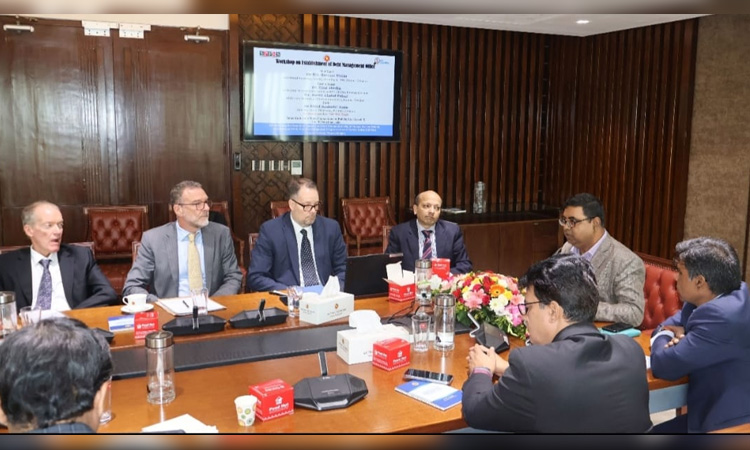News Flash

DHAKA, Nov 4, 2025 (BSS) - A joint International Monetary Fund (IMF) and World Bank technical assistance mission has recommended establishing a unified Debt Management Office (DMO) in Bangladesh to strengthen the country's public debt management framework and reduce fiscal and operational risks.
The proposal was presented at a workshop titled "Establishing a Debt Management Office" held on Monday at Finance Division in Bangladesh Secretariat here, said a press release.
The workshop was organized by the Finance Division's "Scheme on Strengthening the Capacity of the Treasury and Debt Management Wing," as part of the Strengthening Public Financial Management to Enable Service Delivery (SPFMS) programme.
The mission observed that Bangladesh's debt management functions are currently fragmented across multiple agencies, resulting in coordination gaps, inconsistent debt data, and difficulties in formulating and executing a comprehensive strategy.
It also highlighted the absence of a centralized and audited debt database and the lack of a formal cash flow forecasting mechanism-both considered essential for guiding informed and cost-effective government borrowing.
Md Hasanul Matin, Additional Secretary (Administration, Planning & TDM), Finance Division, attended the workshop as chief guest.
Special guests included Dr Ziaul Abedin, Additional Secretary (Budget-1) and National Programme Director of SPFMS, and Hasan Khaled Foisal, Additional Secretary (Macroeconomics-1), Finance Division. The session was presided over by Mohd Rashedul Amin, Joint Secretary of the Treasury and Debt Management Wing.
The IMF-World Bank mission was led by Arindam Roy, Senior Financial Sector Expert, accompanied by Dr. Jens Clausen, Philip R. D. Anderson, and Per Jonsson.
Expert opinions were also presented by Md. Monzorul Haque, Joint Secretary (Expenditure Management), Finance Division, and Mr. Abu Daiyan Mohammad Ahsanuallah, Joint Secretary, Economic Relations Division.
In its presentation, the mission proposed consolidating all government and government-guaranteed debt functions under the Finance Division, beginning with the restructuring of the Treasury and Debt Management Wing.
In the initial phase, the proposed DMO would oversee domestic debt issuance, develop annual borrowing plans, coordinate auction calendars, undertake portfolio risk assessments, and build a unified debt database by integrating existing systems and data repositories.
The mission emphasized the need for a clear legal framework to define borrowing authority, accountability, reporting responsibilities, and transparency standards.
To ensure professional execution, the mission recommended staffing the DMO with personnel experienced in capital markets, pricing, settlement operations, and risk management.
It noted that such expertise could be sourced from Bangladesh Bank, commercial banks, and the capital market. However, to retain skilled professionals, the government would need to introduce competitive compensation and career development pathways.
The experts stated that over the medium term, the DMO could evolve into a more autonomous entity with expanded functions, including contingent liability oversight and investor relations management.
International experience, presented during the workshop, showed that many countries have shifted to centralized DMOs since the 1980s to reduce borrowing costs and risks, strengthen fiscal transparency, and improve the separation between debt management and monetary policy operations.
The mission highlighted that successful DMOs generally operate through three core units-front office (borrowings and market transactions), middle office (risk and strategy), and back office (settlements data administration, accounting and reporting).
The mission concluded that establishing a DMO will require strong political commitment, phased restructuring, investment in modern IT systems, and sustained coordination across government institutions. Once operational, the unified DMO is expected to enhance market confidence, lower financing costs and risks, and reinforce Bangladesh's long-term fiscal stability.